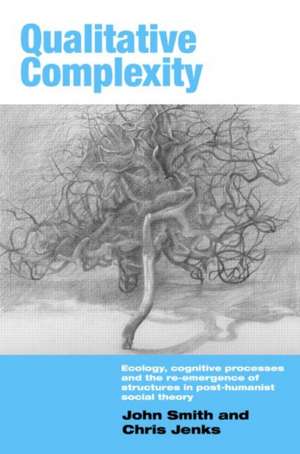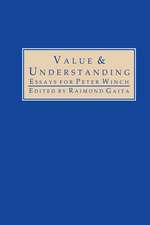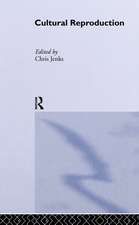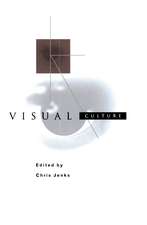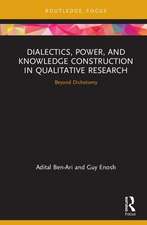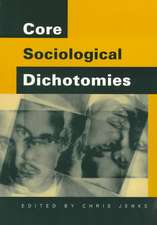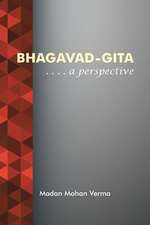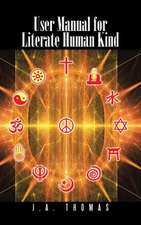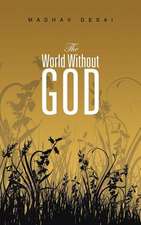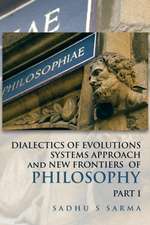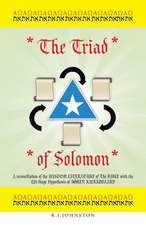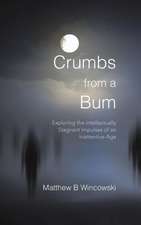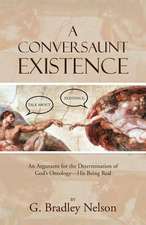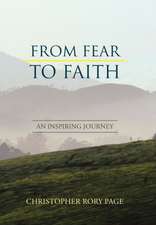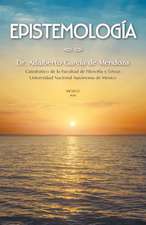Qualitative Complexity: Ecology, Cognitive Processes and the Re-Emergence of Structures in Post-Humanist Social Theory: International Library of Sociology
Autor John Smith, Chris Jenksen Limba Engleză Paperback – 13 feb 2007
| Toate formatele și edițiile | Preț | Express |
|---|---|---|
| Paperback (1) | 342.44 lei 43-57 zile | |
| Taylor & Francis – 13 feb 2007 | 342.44 lei 43-57 zile | |
| Hardback (1) | 914.12 lei 43-57 zile | |
| Taylor & Francis – 9 mar 2006 | 914.12 lei 43-57 zile |
Din seria International Library of Sociology
-
 Preț: 424.69 lei
Preț: 424.69 lei - 18%
 Preț: 1203.70 lei
Preț: 1203.70 lei - 18%
 Preț: 1078.82 lei
Preț: 1078.82 lei - 18%
 Preț: 1894.35 lei
Preț: 1894.35 lei - 15%
 Preț: 490.09 lei
Preț: 490.09 lei - 15%
 Preț: 504.71 lei
Preț: 504.71 lei - 15%
 Preț: 457.92 lei
Preț: 457.92 lei - 18%
 Preț: 1609.13 lei
Preț: 1609.13 lei - 15%
 Preț: 397.57 lei
Preț: 397.57 lei - 15%
 Preț: 416.88 lei
Preț: 416.88 lei - 18%
 Preț: 1072.90 lei
Preț: 1072.90 lei - 18%
 Preț: 1302.26 lei
Preț: 1302.26 lei - 15%
 Preț: 416.24 lei
Preț: 416.24 lei -
 Preț: 427.35 lei
Preț: 427.35 lei - 15%
 Preț: 449.67 lei
Preț: 449.67 lei - 15%
 Preț: 450.98 lei
Preț: 450.98 lei - 15%
 Preț: 403.68 lei
Preț: 403.68 lei - 18%
 Preț: 1196.71 lei
Preț: 1196.71 lei - 18%
 Preț: 1070.76 lei
Preț: 1070.76 lei -
 Preț: 443.21 lei
Preț: 443.21 lei -
 Preț: 311.16 lei
Preț: 311.16 lei - 15%
 Preț: 406.68 lei
Preț: 406.68 lei - 15%
 Preț: 519.02 lei
Preț: 519.02 lei - 18%
 Preț: 1664.66 lei
Preț: 1664.66 lei - 18%
 Preț: 1439.26 lei
Preț: 1439.26 lei - 15%
 Preț: 402.29 lei
Preț: 402.29 lei - 18%
 Preț: 1353.97 lei
Preț: 1353.97 lei - 18%
 Preț: 1200.37 lei
Preț: 1200.37 lei - 18%
 Preț: 1197.41 lei
Preț: 1197.41 lei -
 Preț: 438.24 lei
Preț: 438.24 lei - 18%
 Preț: 1356.11 lei
Preț: 1356.11 lei - 18%
 Preț: 1252.68 lei
Preț: 1252.68 lei - 15%
 Preț: 503.76 lei
Preț: 503.76 lei - 18%
 Preț: 1195.94 lei
Preț: 1195.94 lei - 18%
 Preț: 2373.02 lei
Preț: 2373.02 lei - 15%
 Preț: 459.10 lei
Preț: 459.10 lei - 15%
 Preț: 574.01 lei
Preț: 574.01 lei - 18%
 Preț: 679.15 lei
Preț: 679.15 lei - 15%
 Preț: 401.04 lei
Preț: 401.04 lei - 15%
 Preț: 453.92 lei
Preț: 453.92 lei - 18%
 Preț: 1067.90 lei
Preț: 1067.90 lei - 18%
 Preț: 1614.18 lei
Preț: 1614.18 lei -
 Preț: 250.07 lei
Preț: 250.07 lei - 15%
 Preț: 439.01 lei
Preț: 439.01 lei - 18%
 Preț: 1407.02 lei
Preț: 1407.02 lei
Preț: 342.44 lei
Puncte Express: 514
Preț estimativ în valută:
60.52€ • 71.20$ • 52.83£
60.52€ • 71.20$ • 52.83£
Carte tipărită la comandă
Livrare economică 06-20 aprilie
Specificații
ISBN-13: 9780415439671
ISBN-10: 0415439671
Pagini: 310
Ilustrații: 1 line drawing
Dimensiuni: 156 x 234 x 17 mm
Greutate: 0.44 kg
Ediția:1
Editura: Taylor & Francis
Colecția Routledge
Seria International Library of Sociology
Locul publicării:Oxford, United Kingdom
ISBN-10: 0415439671
Pagini: 310
Ilustrații: 1 line drawing
Dimensiuni: 156 x 234 x 17 mm
Greutate: 0.44 kg
Ediția:1
Editura: Taylor & Francis
Colecția Routledge
Seria International Library of Sociology
Locul publicării:Oxford, United Kingdom
Public țintă
Postgraduate and UndergraduateCuprins
Part 1: The Interdisciplinary Field 1. Complexity Theory: A Positioning Paper 2. From Descartes’ Conjecture to Kant’s Subject and the Computo 3. Autopoiesis in Cognitive Biology 4. Emergentism, Evolutionary Psychology and Culture 5. Prigogine’s Thermodynamics, Ontology and Sociology Part 2: Critical Developments 6. Modernism and Determinism: Linear Expectations and Qualitative Complexity Analyses 7. Complexity Theory as a Critique of Postmodernism 8. Cognition and the Renewal of Systems Theory: Redundant Idioms and Disputed Positions 9. The Evolution of Intelligence, Consciousness and Language: Implications for Social Theory 10. Complexity, Language and Culture: Social Systems in Qualitative, i.e. not Formal Terms Part 3: The Fields of Complex Analysis: Contemporary Complexity Theory 11. The Ethics of Pragmatism: Politics and Post-Structuralism in Transition after the Complexity Turn 12. The Topology of Complexity 13. Re-Interpreting Global Complexity as an Ontology: Human Ecology
Descriere
Drawing from sources in sociology, philosophy, complexity theory, 'fuzzy logic', systems theory, cognitive science and evolutionary biology, the authors present a new series of interdisciplinary perspectives on the sociology of complex, self-organizing structures.
